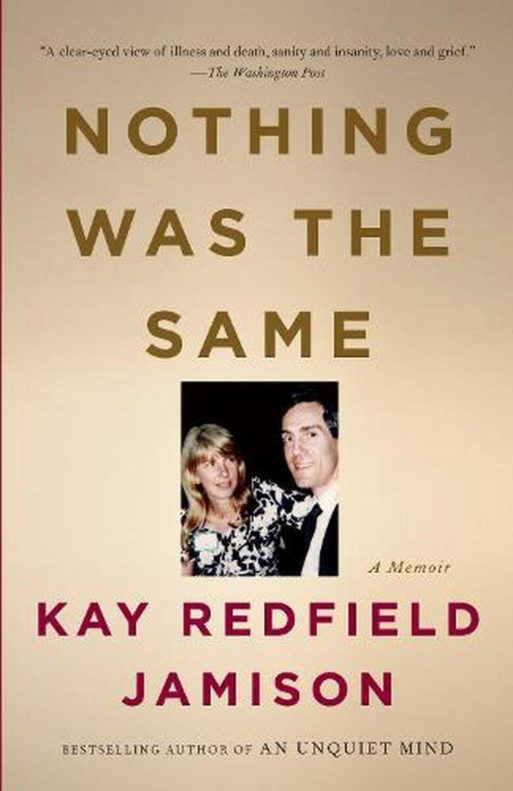 In 1995, Kay Redfield Jamison published her book, “An Unquiet Mind” about her struggle with bipolar disorder. She wrote about suffering the unbearable lows of depression and the shattering highs of mania. With the help of her husband, family, friends and psychiatric treatment, her moods slowly stabilized.
In 1995, Kay Redfield Jamison published her book, “An Unquiet Mind” about her struggle with bipolar disorder. She wrote about suffering the unbearable lows of depression and the shattering highs of mania. With the help of her husband, family, friends and psychiatric treatment, her moods slowly stabilized.
Then the unthinkable happened. Kay’s husband, Richard Wyatt, a neuropsychiatrist, was diagnosed with lung cancer. His doctors gave him between six and 18 months to live. In crisis mode, Kay again put pen to paper to try to make sense of her life. The resulting book, published in 2009, was called “Nothing Was the Same.”
The first section of the book describes how Kay and Richard met and fell in love. They enjoyed nature, poetry, music and science. They were both devoted academics who taught, published and read voraciously.
Richard never treated Kay as a patient, but he did worry about her bipolar disorder. He often went with her when she visited her psychiatrist. Together, the two of them discovered that taking lithium and getting plenty of sleep helped to keep Kay’s moods stable.
The second part of “Nothing Was the Same” deals with Richard’s illness. Kay describes their last two Christmases together as quiet peaceful times.
Richard, dyslexic from birth, had always found it hard to read. Facing the battle with cancer and taking medication that made it difficult for him to focus, he could hardly read at all anymore. So Kay read aloud to him. Sometimes she read the poems or stories they both loved. Other times she read scientific papers and helped him puzzle out their meanings.
As Richard’s disease progressed, he spent most of his time sleeping. Eventually he slipped into a coma. The doctor’s told Kay he would never awaken. Kay made the decision to remove Richard from life support. She was somewhat comforted because Richard had made his wishes clear in his living will. If there was no further hope, he wanted to be allowed to die without pain and with Kay at his side.
Kay writes about being in the hospital the night before Richard’s death. Although she yearns to stay with him through the night, she remembers how insistent he was that she take care of herself so her bipolar mood swings did not return. She went home, went to bed, and returned to the hospital in the morning to be with Richard when the life support was removed.
The third part of “Nothing Was the Same” is probably the most interesting to people who, like Kay, are suffering from grief and a mental health disorder. Kay draws a strong line between grief and depression. Although she grieved for Richard, she never became depressed over his death. Depression, she writes, is a lack of hope sometimes so profound that it leads to suicidal thoughts and behaviors. Grief, on the other hand, is a slow regaining of hope.
In “Nothing Was the Same,” Kay states,
“My thoughts did not dwell on the pointlessness of life; they dwelled, instead, on the pain of missing a life. Hope can find a place in a mind missing love. It cannot find a place in a mind taken over by depression. In grief, one feels the absence of a life, not life itself. In depression, it is otherwise: one cannot access the beat of life.”

Credit: news.aamc.org
Kay Redfield Jamison’s writing is compelling and courageous, whether she is sharing a humorous anecdote or the horrible moments in the hospital with Richard when she realizes his death is imminent. “Nothing Was the Same” may be of special interest to people who are grieving while also trying to live with a mental illness. Kay is especially clear that there is a difference between normal grieving and psychiatric symptoms. She also encourages fellow sufferers to take good care of themselves – to keep taking their medicines, to get plenty of rest, to exercise regularly and to do whatever else staves off the illness.
She also talks about what got her through the grieving process. The most helpful thing she did was to visit Richard’s grave frequently. Sometimes she brought flowers or a book of poetry they had shared. An extrovert, Kay also got together frequently with family and friends to share a meal or just a cup of coffee. It helped keep the loneliness at bay.
If you have not read “Nothing Was the Same,” consider giving it a try. It is one of the best books about bereavement I have ever read.

 “Nothing Was the Same” by Kay Redfield Jamison
“Nothing Was the Same” by Kay Redfield Jamison


 Flawed Kidney Function Test Discriminated Against Black Patients
Flawed Kidney Function Test Discriminated Against Black Patients

 Harmony Amidst Change: Japan’s Kezouin Fuchu-shi Cemetery
Harmony Amidst Change: Japan’s Kezouin Fuchu-shi Cemetery














